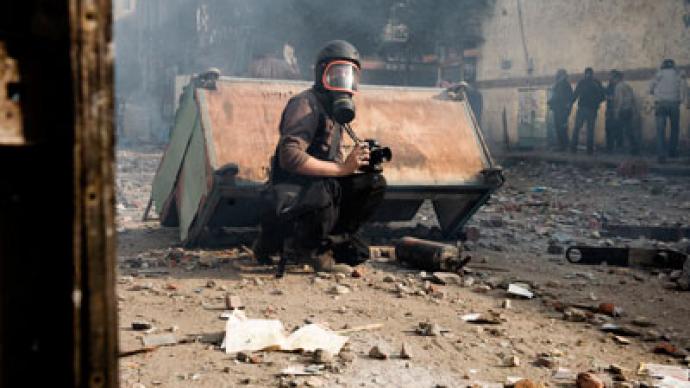A group of international journalists – including members of RT's Arabic team – have been caught in crossfire in Syria while covering the army's operations outside the capital. RT’s correspondent suffered light injuries while trying to escape.
Syrian government forces have been trying to clear the area of rebels occupying the Damascus suburb of Daraya. Several international journalists, including Russians, Iraninans and Syrians, joined the group to report on the early morning operation and found themselves caught in heavy gunfire.“We were moving from street to street, and when we reached the dock, my colleagues and I got caught in crossfire,” RT Arabic correspondent Kamel Saqer explained.“We tried to escape, running one after another fearing that armed rebels would notice us. A Syrian army soldier accompanied us the entire time – he constantly kept his eye on the situation and helped us to escape the gunfire.”It was unclear whether the rebels were deliberately targeting journalists, all of whom were wearing bulletproof vests with clearly visible word 'press' on them, Saqer said.The firing was very intense and it was difficult to find shelter, Saqer added. “I ran and fell down, I hurt my arms – but the Syrian army doctors gave me first aid on the scene. So I could continue to do my job.”One of the Syrian cameramen was also slightly wounded.
‘There’s no way to be safe in wartime’
According to recent studies, Syria was the most dangerous country for journalists in 2012, with over 50 correspondents killed while covering the conflict. “The reality is there is no way to be safe in wartime,” an award-winning war correspondent Russ Baker told RT. “It is just inherently dangerous.”A member of the Syrian Opposition Coalition previously said that Russians in Syria have become legitimate targets, claiming they are “cooperating with enemy forces”And Baker believes that the very fact that most journalists are perceived as somewhat biased increases the danger to them during the wartime.“The reality is that very few news organizations are seen as truly objective or open minded. And I suppose that just as people from RT may be seen as in some ways skeptical of the rebels, American journalists are going to face the opposite kind of thing.”“Unfortunately I now consider a lot of combat coverage to be sort of in the realm of entertainment,” he added. “And what I mean by that is that it doesn’t really provide people with any kind of great insight into what really is going on.”Many international journalists are reported missing or have been detained in Syria, one of them is Ukrainian Anhar Kochneva who is being held captive by the Free Syrian Army. Generally there is no condemnation of such cases from the world powers which back the opposition, and Baker believes that is because such incidents do not fit the reality they are trying to present.“This is a general problem that all journalists have to be treated alike and we’ve got to have some kind of standardization of the criteria. But war is a game of propaganda and unfortunately there is very little context to any of this.”

